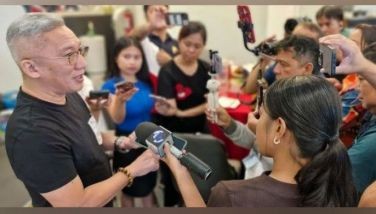Former Talisay mayors told to return P29M
CEBU, Philippines - The Commission on Audit has ordered former Talisay City mayors Eduardo Gullas and Socrates Fernandez and their 13 department heads to return P29 million used for the city’s computerization project and liquid fertilizer whose purchases were allegedly laced with irregularities.
“Please be informed that the above COA Decisions have become final and executor pursuant to Section 9, Rule X of the 2009 Revised Rules of Procedure of the Commission on Audit, as modified under COA Resolution No. 2011-006 dated August 17, 2011. The said decisions affirmed the above (Notice of Disallowan-ces),” read COA’s notice of final decision dated August 5, 2015.
COA secretary Nilda Paras added that the persons liable “shall pay” the P29,360,762.70 “immediately” to the agency’s cashier.
“Failure to pay the same shall authorize the agency cashier to withhold payment of salary and other money due to persons liable in accordance with COA Order of Execution to be issued to the agency casher,” the decision read.
COA named the “persons liable” for the two projects as Gullas, who served as city mayor from 2001-2004, then city administrator/lawyer Aurora Econg, general services officer Joan Vebar, city engineer Audie Bacasmas, human resources officer Emely Cabrera, city accountant Viluzminda Villarante and city treasurer Emma Macuto.
Socrates succeeded Gullas in 2004 as mayor and retained all the liable department heads in his administration.
Also made liable to pay the amount were former city registrar Gemma Ladion, city building administrator Ariel Araw-araw, assistant city engineer Gamaliel Vicente, city agriculturist Rene Galado, Melanie Lavador and Rey Lumapas.
Equipment supplier Powerdev Corporation or Marlon Alfonso (being the payee) and Gracias Industries Supplier are also made to pay the amount. Gracias Industries supplied the city the liquid fertilizer.
COA had earlier issued four notices of disallowances on the irregularities on April 23 and July 23, 2007. In 2007, it released two decisions, April 23 and December 28, on the said findings.
During the time of Gullas, the city reportedly purchased P26,988,000 worth of equipment for its “Information Technology Project.”
But in its findings in the city’s financial operations in 2004, COA found “deficiencies” in the Audit Observation Memoranda (AOM), prompting it to issue a notice of suspension as the purchases were not backed with ordinances or resolutions. Instead, the funds were disbursed through four executive orders issued by former mayor Gullas in 2004, and the year after by former mayor Fernandez who assumed Gullas’ post.
The bids and awards committee (BAC), Gullas, Villarante, Mabunay, Macuto and Alfonso were implicated for the P8,500,000 deal used to purchase the Business Licensing Integration to Real Property Assessment, Personnel Information System and Automated Timekeeping System technologies without any ordinance for the fund realignment made thru an executive order signed by Gullas.
Suspension notices were also issued for the P613,440 and P10,086,560 appropriations for other technology purchases which reportedly have deficiencies involving the BAC, Macuto, Villarante, Mabunay, Bacasmas, Fernandez, and Alfonso.
The same persons were allegedly responsible for the questionable disbursement of P7,788,000 for another equipment purchase which reflected in the Audit Observation Memoranda dated February 9, 2005.
Powerderv was the sole payee for all the equipment purchased for the particular project.
As for the liquid fertilizer, the city in 2005, under the administration of Fernandez, reportedly bloated the purchase of the liquid fertilizer.
The city reportedly purchased 3,071 bottles of liquid fertilizer bought from the P3 million Priority Development Assistance Fund. It was the Manila-based Garcias Industries Supplier that won the bidding.
Based on COA’s review, each bottle of fertilizer was bought at P900 from the supposed P171 per bottle at that time in Pacifica Agrivet. Also, COA’s Technical Services Office discovered that the said fertilizers were rejected as what was inside the bottles was not in the label, yet the city still distributed them to the farmers. — Liv G. Campo/ATO(FREEMAN)
- Latest






















